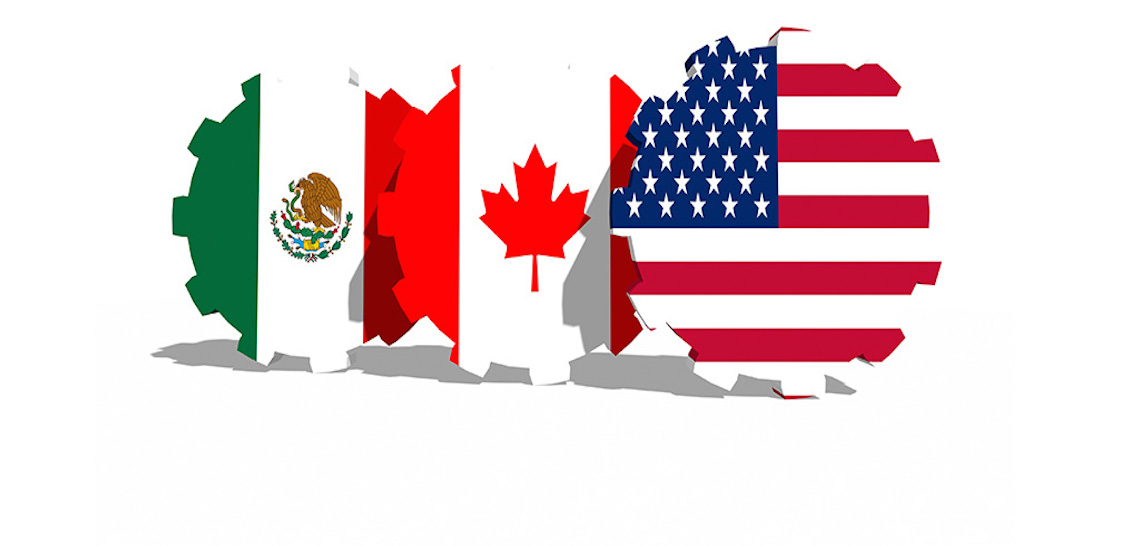Amid the US President Donald Trump’s protectionist tendencies and claims to erect the wall on U.S-Mexico border, it is a high probability that Mexico may be expelled from NAFTA.
The North American Free Trade Agreement, taken effect on January 1st 1994, is considered to be one the prominent achievements of international free-market, by eliminating most of the tariffs between the world’s major economies – the USA (1st), Canada (10th) and Mexico (15th).
The eventual impact of this agreement is Mexico achieved status of the second largest trading partner (after the People’s Republic of China) for the USA. For both states, the main imports from Mexico into the USA and Canada, are mainly machinery equipments, electronics (such as television sets), vehicles (such as automobiles and gas-powered trucks), clothing and agricultural commodities (including tomatoes, peppers and avocados).
Despite that the U.S. is the largest import partner for Mexico (over 80.3%), Canada is not considered on Mexican top list. Instead, Canadian industry established offices of large corporations, such as Magna International, TransCanada, Bombardier Inc, GoldCorp and ScotiaBank. Such circumstance stimulated to outsource Canadian jobs abroad, and leave a lot of young Canadians in a long-term unemployment as these multi-national companies can hire employers living in Mexico, where its population is poorer and larger than Canada’s (at least 100 million people), and prefer to work for lower wages.
In case, if Mexico will be expelled from NAFTA, Canada can bring most of its industries back to domestic sector and hire unemployed young Canadian graduates, specialists and other high-skilled personnel. In addition, this factor is beneficial for mutual business partnerships between Canada and the European Union, after CETA provisionally takes effect on April 1st 2017.
Canada would become more competitive in terms of research and development on global market. On other side, European firms can sign partner agreements with Canadian companies to contribute more commodities and services related to the tertiary economic sector. Such circumstances would help Canada to expand business sector in the European Union. For example, Blackberry company would become an affordable software firm for European customers and business companies, which widely use computers and other data-sharing technologies.
It is essentially beneficial for the Eastern European economies, such as the Republic of Poland, to replace Mexico as the main import states, for Canada, in terms of machinery products and other technology-related commodities. Canadian market demand would boost jobs and volume of production in less developed states of Europe. At the same time, aside of the tariff-less CETA agreement, imported Eastern European commodities would not cost a lot as Czechia, Poland and Hungary do not have perspectives to abandon own cheaper currencies – Czech Krony, Polish Zloty and Hungarian Forint – and join the Eurozone, in a near future.
CETA After Potential Expulsion of Mexico from NAFTA | By Konstantin K. Manyakin, CPCC Intern
European Studies Graduate (EURUS Program), Carleton University & Young European Federalists (JEF) member
REFERENCES
[1] Marlow, I. (2015) ‘China passes Mexico to become largest U.S. Trading partner’. The Globe and Mail, 5 November. Available at: http://www.theglobeandmail.com/report-on-business/international-business/asian-pacific-business/china-passes-canada-as-uss-largest-trading-partner/article27134249/
[2] Murray, C. and O’Boyle, M. (2017) ‘Confident Mexico says will not rush to negotiate NAFTA with Trump’, Reuters, 23 February. Available at: http://www.reuters.com/article/us-usa-nafta-mexico-idUSKBN163033
[3] Vasquez, R. (2015) ‘Top 5 Job-Generating Canadian Companies in Mexico’, PanAmerican World, 13 August. Available at: http://www.panamericanworld.com/en/article/top-5-job-generating-canadian-companies-mexico

Recent Comments